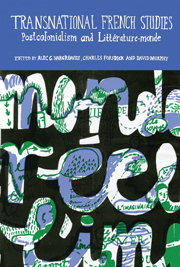Book contents
- Frontmatter
- Contents
- Acknowledgements
- Introduction: What Does Littérature-monde Mean for French, Francophone and Postcolonial Studies?
- From World Literature to Littérature-monde: Genre, History and the Globalization of Literature
- Postcolonialism, Politics and the ‘Becoming-Transnational’ of French Studies
- ‘On the Abolition of the French Department’? Exploring the Disciplinary Contexts of Littérature-monde
- Francophonie: Trash or Recycle?
- (Not) Razing the Walls: Glissant, Trouillot and the Post-Politics of World ‘Literature’
- The ‘Marie NDiaye Affair’ or the Coming of a Postcolonial Evoluée
- (R)Evolutions
- Littérature-monde and Old/New Humanism
- Mapping Littérature-monde
- Afterword: The ‘World’ in World Literature
- Appendix: Toward a ‘World-Literature’ in French
- Notes on Contributors
(Not) Razing the Walls: Glissant, Trouillot and the Post-Politics of World ‘Literature’
from Postcolonialism, Politics and the ‘Becoming-Transnational’ of French Studies
- Frontmatter
- Contents
- Acknowledgements
- Introduction: What Does Littérature-monde Mean for French, Francophone and Postcolonial Studies?
- From World Literature to Littérature-monde: Genre, History and the Globalization of Literature
- Postcolonialism, Politics and the ‘Becoming-Transnational’ of French Studies
- ‘On the Abolition of the French Department’? Exploring the Disciplinary Contexts of Littérature-monde
- Francophonie: Trash or Recycle?
- (Not) Razing the Walls: Glissant, Trouillot and the Post-Politics of World ‘Literature’
- The ‘Marie NDiaye Affair’ or the Coming of a Postcolonial Evoluée
- (R)Evolutions
- Littérature-monde and Old/New Humanism
- Mapping Littérature-monde
- Afterword: The ‘World’ in World Literature
- Appendix: Toward a ‘World-Literature’ in French
- Notes on Contributors
Summary
Despite a great deal of cultural materialist work over the past several decades devoted to the insight that literature is, in Alan Sinfield's words, ‘an institutional arrangement we have made to dignify some writing (at the expense of other)’ (2004: 31), Francophone postcolonial studies, as I have argued on more than one occasion, remains invested in an idealist conception of the literary text as ‘“rising above” its conditions of production and reception’ (Sinfield, 2004: 31). One might venture that there is no greater proof of this belated investment than the excessive amount of scholarly ink that has been spilled – and that, as this volume testifies, continues to be spilled – over the manifesto ‘Pour une “littérature-monde” en français’ since its publication by Michel Le Bris, Jean Rouaud et consortes in March 2007. What, we might well ask, is at stake in their (our) continuing investment in the salvific virtues of ‘literature’ – a word that might, at first glance, seem the least problematic component of a seductive buzz phrase like ‘world literature (in French)’? That is the question I want to address here, not by lingering over the actual manifesto and interrogating its purported deconstruction of the French/Francophone binary (authentic act of literary decolonization or yet another instance of Franco-phony rhetoric? … readers will have little difficulty identifying where I stand on that score), but by focusing on two Caribbean-born writers who contributed to the eponymous follow-up collection of essays published later that year by Gallimard (Pour une littérature-monde).
- Type
- Chapter
- Information
- Transnational French StudiesPostcolonialism and Littérature-monde, pp. 125 - 145Publisher: Liverpool University PressPrint publication year: 2010

